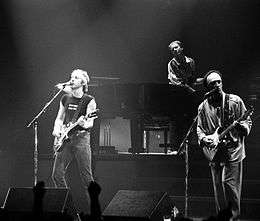Alan Clark (keyboardist)
| Alan Clark | |
|---|---|
 Alan Clark playing with Dire Straits in 1985 | |
| Background information | |
| Born |
5 March 1952 Great Lumley, County Durham England |
| Genres | Rock and roll, folk rock, blues rock |
| Occupation(s) | Musician, Producer, Musical director |
| Instruments | Keyboard instruments |
| Years active | 1960s-present |
| Labels | Vertigo Records, Warner Bros. Records (US) |
| Associated acts | Dire Straits, Eric Clapton, Bob Dylan, Geordie |
| Website | alanclarkmusic.com |
Alan Clark (born 5 March 1952 in Great Lumley, County Durham) is an English musician who was the first and main keyboardist for the rock band Dire Straits.[1]
Biography
As a young child, Clark received piano lessons. Then, at the age of 13 and while still a pupil at Chester-le-Street Grammar School, he played Hammond organ in working men's clubs. He resumed his formal musical education at Durham Technical College and was offered a place at the Guildhall School of Music, but turned it down because by then he was already forging a successful career in music which included, while also working on a solo career, playing with a reformed Geordie which featured Brian Johnson who would later join AC/DC, and recording on a number of tracks of the Geordie album No Good Woman; playing and recording with a duo called Splinter who were signed to George Harrison's Dark Horse label; playing and recording with Gallagher & Lyle; and he did a tour of summer festivals with Lindisfarne, which included Knebworth.
Clark joined Dire Straits in 1980, becoming their first and main keyboard player. Clark continued with Dire Straits, co-producing the band's last album, On Every Street with Knopfler, until the band's eventual breakup in the mid-1990s.[1]
In 1983 he played on Bob Dylan's album Infidels and also on the following Empire Burlesque album. Clark also worked with Knopfler on some of his film soundtrack work, most notably on the film Local Hero, in which he also makes a brief appearance as a piano player. He has also worked with Mark's brother David on his solo albums and toured and recorded extensively with Eric Clapton as well as playing in the "Orchestra Nights" performances with the National Philharmonic Orchestra and Michael Kamen during the 24 Nights concerts at the Royal Albert Hall in 1990 and 1991. Throughout his time with Dire Straits, he was also Tina Turner's musical director, and played on and arranged her hit "Private Dancer". Clark has also played and recorded with other artists, including the Bee Gees, Gerry Rafferty, The Blessing, Escape Club, Bo Diddley, Buddy Guy, Billy Joel, Lou Reed, Dave Stewart, David Knopfler, Gallagher and Lyle, Prefab Sprout, Mary Hopkins, Shakin Stevens, Matt Monroe, Mark Knopfler, Rory Block, Westernhagen, Della Miles, Mick Hucknall, Sky, Joan Armatrading, Lindesfarne, Geordie, Brian Johnson, Jimmy Nail, Robert Cray, Al Green, Jamie Catto, Cheshire, Y-Company, Van Morrison, Sly and Robbie, Roger Daltrey, George Harrison, Elton John, Phil Collins and Bruce Willis.
In 2001 Clark composed the music for the long-running paranormal show Most Haunted, and he also composed themes for other TV shows and commercials.
In 2004 he performed the theme from Local Hero with Mark Knopfler at the opening of Alan Shearer's bar in Newcastle United football ground.
In 2005 he wrote, directed and scored a film to commemorate 25years of the Great North Run, called The Inspiration, which was screened and performed live with the northern Philharmonic at The Sage in Newcastle.
In 2010 Clark reunited with Dire Straits band members John Illsley and Phil Palmer at the XRoads club in Rome.
In 2011 he formed a band, the Straits, to play the music of Dire Straits at a charity show at the Albert hall, that featured drummer Steve Ferrone from Tom Petty and the Heartbreakers, and Dire Straits' guitarist Phil Palmer. The band went on to perform other successful shows.
In 2015 he formed and is currently a member of a band called Y-Company, with singer/guitarist Jamie Squire, guitarist Adam Phillips, drummer Andy Treacey, and bass player Jake Newman.
References
External links
- The Hull Story information from www.lindisfarne.co.uk